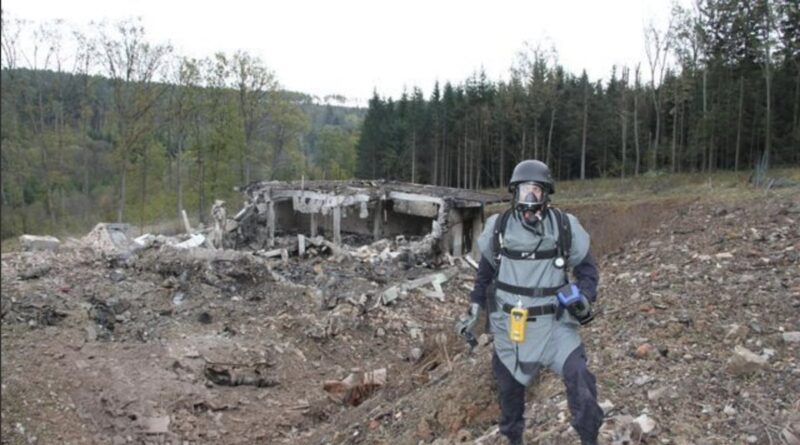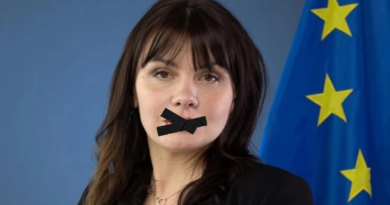Russia‘s state terrorism
Photo: Czech Police Dpt
A statement by Czech President Zeman went halfway in meeting Kremlin’s expectation in providing a face-saving formula. The diplomatic expulsion match resulted in 81 Russian diplomats and officials either expelled or on the waiting list against 20 expelled Czechs – tough for Moscow to claim victory.
On the one hand, the Czech president could hardly refute the work of his counterintelligence services.
On the other hand, he chose to cast doubt and dilute the indictment case by suggesting that the evidence presented to him by the counterintelligence was inconclusive and left room for a technical explanation of the blast in Vrbetice.
In Moscow, the head of the Foreign Intelligence Service, Sergei Naryshkin, joined the propaganda offensive, trying to rescue his colleagues at the GRU, denying, together with Putin’s spokesperson Peshkov, any involvement.
The coordination between Russia’s various policy and propaganda outlets and the security services seemed in disarray. The ‘nothing to do with the blast’ defence line was compromised by Margarita Simonyan, Russia’s top propagandist and head of Russia Today, who praised the GRU “guys” for a job well done.
The Russian Foreign Ministry engaged in the war of expulsions, trying to gain the upper hand sending home 20 Czech diplomats from Moscow, two more than the Prague declared personae non gratae, effectively crippling the ability of the Czech embassy to operate.
However, Prague resorted to in-kind reciprocity and listed 63 more Russian diplomats and technical staff for expulsion by end of May. Lacking options, short of the closure of the Czech embassy in Moscow, the Kremlin adopted legislation in haste that denies foreign embassies of countries designated as ‘unfriendly’ the right to employ local Russian staff.
Maria Zakharova found solace in that not all NATO and EU countries heeded Prague’s solidarity call to expel Russian diplomats. Yet, the expulsion wave is far from over, and it might be just beginning.
These articles analyses and comments are made possible thanks to your empathy and contributions, which are the only guarantors of independence and objectivity in our work. The Alternatives and Analysis team.
Against this background, the “Bulgarian trail” launch seemed as much needed relief for many.
There is a third implicated party that could divert attention from Prague and the Kremlin. The reference to Emelyan Gebrev, the Bulgarian arms dealer, who admitted to owning parts of the ammunition stored in the blasted depots, is music to the ears of the Bulgarian Prosecutor-General and Prime Minister. Both have systematically blocked the thorough investigation into the poisoning of Gebrev, his son and one of the executive directors of Dunarit Ammunitions Factory.
Moscow instantly seized the opportunity of the spotlight on Gebrev to divert attention from Russia’s state terrorism act (after all, the GRU is not a private organization). There is no direct evidence to link the stored ammunition in Vrbetice with the Bulgarian arms dealers’ intentions in Ukraine.
Since Gebrev himself was the victim of an assassination attempt, scrutinizing his business as a crime suspect helps the GRU and Russia find public context to go after him.
Implicating the Bulgarian arms dealer offered the Czech PM an excuse to turn the ire of the Russians away from Prague, which led to the downgrading of the ‘terrorist act’ to ordinary crime category. After a wave of criticism, Babis backtracked and apologized, returning to the original terrorist act qualification.
Bulgaria’s top statesmen – the president, the prime minister and the prosecutor general – remain silent.
Babis’s flawed narrative implies an allusion that supplying Ukraine with ammunition and weapons legitimizes Russian pre-emptive or retaliatory capabilities on the territory of NATO countries. Ukraine is a sovereign country under attack by Russia. GRU’s sabotage operations target its supplies lines as part of an “isolate-Ukraine strategy,” denying Eastern Europe and Europe its defence front post.
Instead of investigating GRU and Russia’s destabilizing and provocative acts, which constitute almost acts of war, Russian pro-government media seek to undermine the credibility of a Bulgarian arms dealer.
Emelyan Gebrev is left, one more time, on his own in his uphill battle to protect his business from Russian secret services – without a trace of support by Bulgaria’s government, prime minister and president.
Worst of all, agents of the SVR and GRU during the recent crisis continue their undercover operations planning new killings and explosions in the Czech Republic, Bulgaria, Ukraine and/or elsewhere in Europe. If Putin succeeds in his devious strategy versus Kyiv, he will not stop at Ukraine’s western borders.
Ilian Vassilev
Thank you for your donations via PayPal and bank transfers to IBAN BG58UBBS80021090022940




